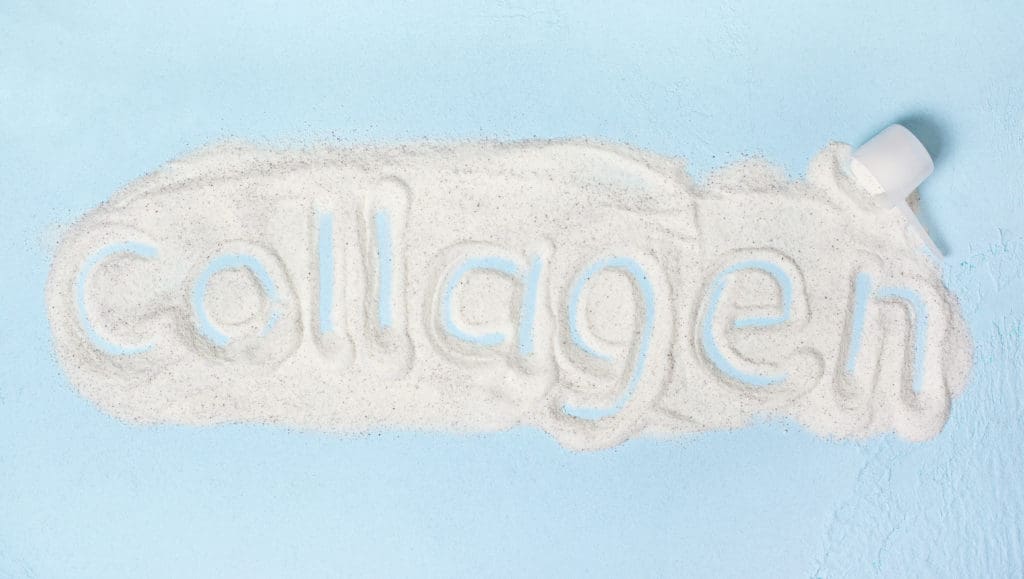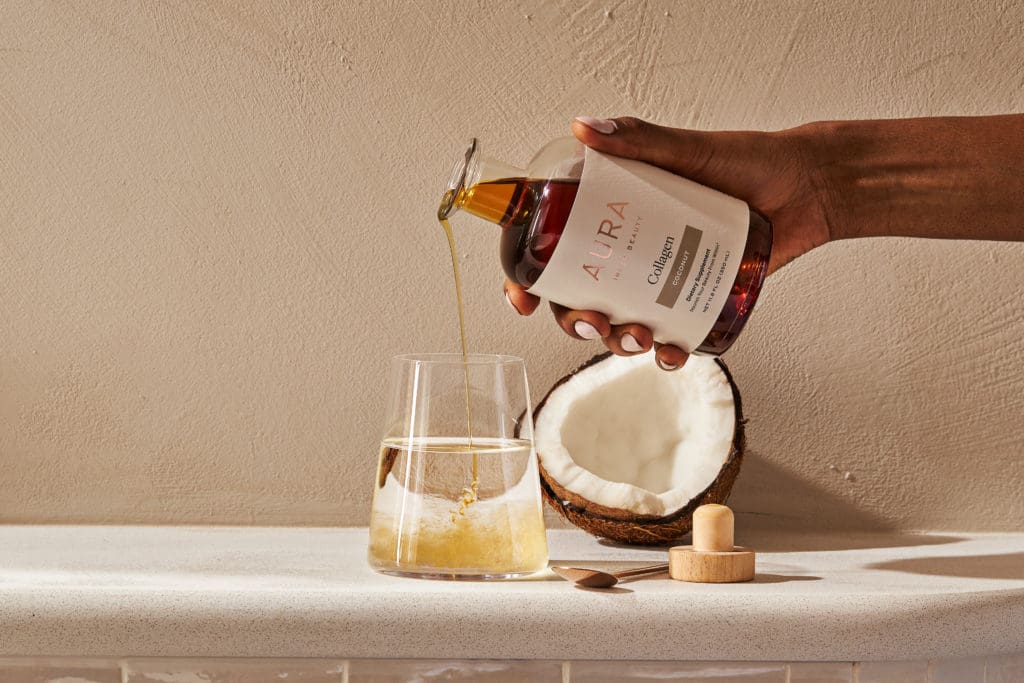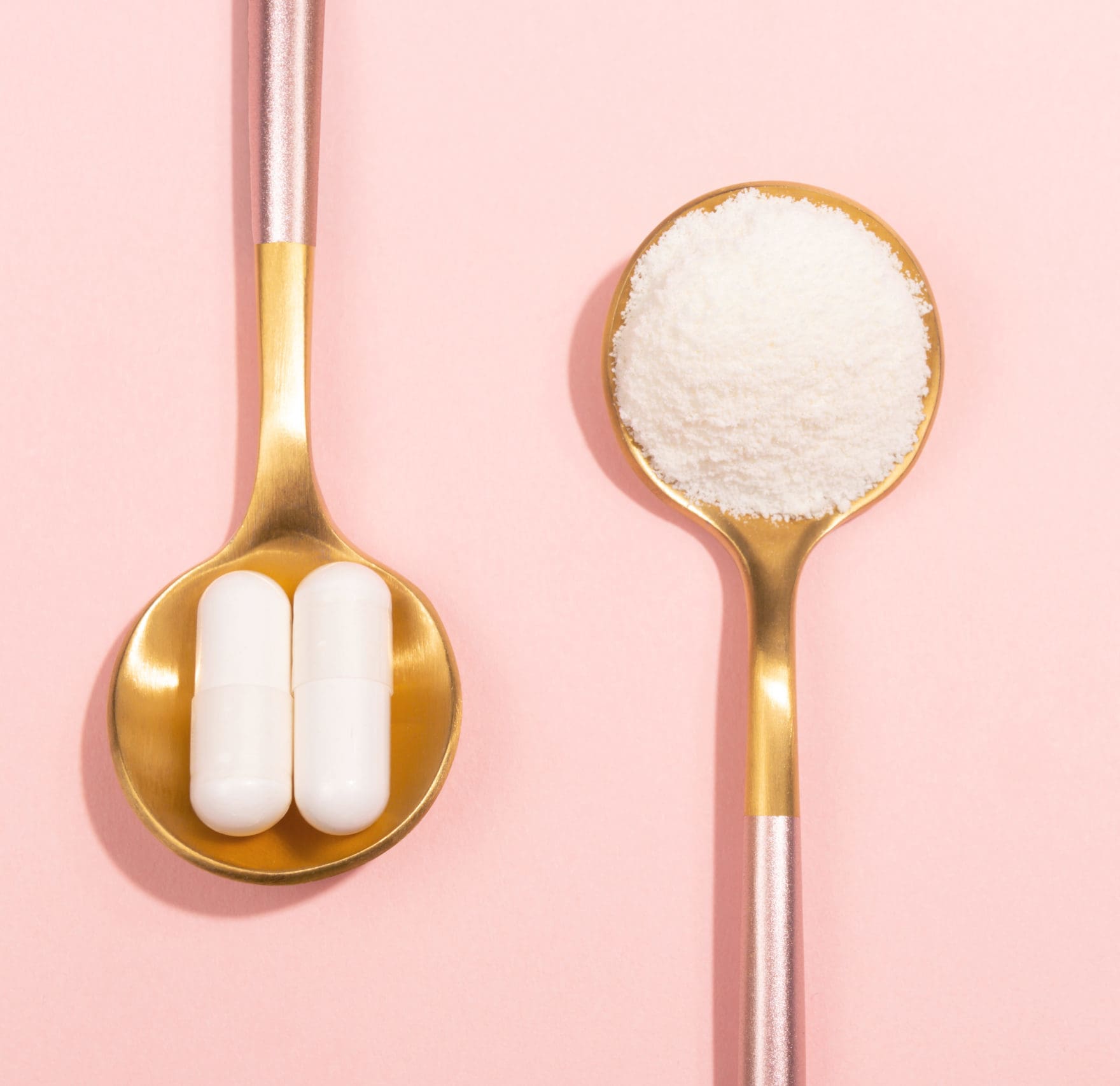It’s not your imagination: you have been hearing more about collagen lately. But what is it? Should you be taking it? How? We aim to clear up some of the confusion.

“Most people don’t know that, without collagen, we wouldn’t be able to form bones, cartilage or skin,” says biochemist Jean-Yves Leroux, president and co-CEO of Medelys, a Quebec company that makes natural health products. “There are 28 types of collagens in our bodies, each with various functions. Overall, their role is structural, mechanical and responsible for making our systems, organs and tissues run smoothly.”
Andrea Pierce-Ghafoor trained as a dietician, and now works as director of insights and innovation at Genuine Health. She says of collagen, “It’s the most abundant protein in your entire body.” It’s found in skin, muscles, tendons, cartilage, bones, organs, teeth, and nails. Among the reasons everyone needs collagen, she lists: “to build up your joints, to increase elasticity of your skin and your hair and your nails. We’re continuing to find new reasons why it’s so important.”
So far, so good. But there is a downside—for anyone over age 20, at least. According to Jenna Mangan, a certified nutritional practitioner at CanPrev Natural Health Products, “Somewhere around our mid-20s our bodies break down collagen faster than we make it. Specifically for women, this catabolic process increases around the menopause age, which is usually where we detect more signs of collagen loss.” She pinpoints the commonly blamed culprits: “sun damage, poor diet, nutrition, stress, overexercise—but it really comes down to the chronological, inevitable aging process.”
As collagen production slows, skin starts to sag, muscles ache, gastrointestinal issues occur, muscle mass decreases and tendons and ligaments stiffen. Certain foods can help— bone broth, chicken, and fish with the skin left on. But most experts agree: it’s practically impossible to get enough collagen through diet alone, which is where supplements come in.
“When you look at the collagen out there, most of the time it has been hydrolyzed into peptides, and that makes it more bioavailable,” Mangan explains. “A lot of research has been done on the size of the peptides, [looking at] their interaction to the receptors on our cells for triggering collagen synthesis at different areas in the body.” In other words, different peptide sizes target different areas of concern, such as joint cartilage tissue or the skin’s fibroblast cells.
Some studies demonstrate that collagen peptides ranging from two to five kilodaltons (kDa), stimulate different cells of our connective tissue (fibroblasts, chondrocytes, osteoblasts and tendon cells, or tenocytes) to influence more collagen production within our skin and muscle, at our joints, bones, tendons, and ligaments. According to Mangan, it’s common to see both marine and bovine peptides in small kilodalton sizes for better targeting fibroblasts cells at the skin, helping to reduce visible wrinkles and aging lines.
Consider, too, the fact that these collagen supplements come from different sources. “Typically, collagen peptides are extracted from bovine [cow], porcine [pig] or marine [fish] sources,” she says. “Unless you have an allergy to one of these or choose not to eat it for some reason, any of these sources is a great choice, since the peptide sequences are very similar.”
CanPrev’s collagen peptides are mostly bovine-derived. “Since we’re as concerned as you are about what goes into your body, our sources are pasture-raised, grass-fed and GMO-free,” says Mangan. “We obtain these peptides by finely breaking down whole protein collagen fibres into very small amino acids chains. These short chains are further sifted and isolated into different bioactive peptides. CanPrev‘s collagen peptides are characterized not only by their small size and precise sequencing but by excellent cold-water solubility. They dissolve well in any beverage while remaining highly bioavailable and easily absorbed.”
Besides powder, collagen supplements also come in liquid or pill form. The key is to find one that works for your lifestyle, so that taking collagen becomes a daily habit. Only by consuming it daily do the positive effects continue.

As for vegan options, according to Avalon Lukacs, founder and CEO of Calgary-based Aura Inner Beauty, “There isn’t really a vegan collagen. If there was, we would use it.” Companies such as Geltor in the U.S. are working on developing vegan formulations, but thorny questions remain around the safety of genetically modified organisms. Lukacs asks, “At what point do we just realize things from nature matter more than being completely vegan? Because there’s usually some sacrifice along the way.”
Adding to consumer confusion are the many products advertised as vegan collagen. “It’s more or less just vitamin C, which is a natural booster of your own collagen production,” says Lukacs. Collagen boosters can be beneficial, but they’re no replacement for collagen supplements.
Certain surface treatments can help with collagen. Formula Fig, a medical spa with locations in Vancouver and one opening in Toronto, offers a Collagen + Texture facial that uses nano-needling, cryo-lymphatic massage and LED light therapy to stimulate collagen production, resulting in skin that looks and feels rejuvenated. Other ways to give your body’s natural collagen a little help include topical formulations such as Graydon’s Fullmoon Serum. It includes African mahogany bark extract, which has been shown to enhance collagen production.
Leroux, ever the biochemist, clarifies how collagen applied externally differs from that taken internally: “When applied topically, it will stimulate localized collagen production but is more limited since peptides and amino acids don’t enter the skin as efficiently as in the gut.”
Much is yet to be learned about collagen. Mangan says, “There’s lots of emerging research out there on wound healing, digestive disturbances and even Alzheimer’s disease, which is quite fascinating.” One thing the scientists do seem to agree on, though, is that collagen is the closest thing we’ve found (so far) to a fountain of youth. —Sheri Radford
Learn more about the discovery of collagen and its versatile health benefits at collagen.ca.
Win! A $150 CanPrev Collagen Prize Pack!
Congrats Mary G. of Charlettown, PEI, who will receive a CanPrev Collagen Prize Pack valued at $150 and including:
- CanPrev Collagen Powder & Liquid
- CanPrev Beautiful Skin (clinically proven to reduce wrinkles)
- CanPrev Silicon
- CanPrev Healthy Hair (clinically proven to reduce hair loss)
Please note: if you are the winner, you will receive a DM (direct message) in Instagram directly from @vitadaily.ca. Please be wary of fake accounts, which often use similar handles with an extra or missing letter, number or symbol. We will never ask for a payment or for your credit card number, and we will never ask you to click through a link. If you are unsure whether you have been contacted, via Instagram, by us or a fake account, email us before responding.

March 28th, 2022 at 9:15 am
I add to my coffee latte every morning! Love it!
March 28th, 2022 at 9:19 am
Would love to try this!
March 28th, 2022 at 9:46 am
Would like the liquid option of the Collagen and would take in the morning. Hoping it helps with skin, nails, hair and muscles. @niferbrad
March 28th, 2022 at 11:50 am
i’d love to add it to my coffee! thanks for the chance ☕️?
@seafoodmwg
March 28th, 2022 at 2:28 pm
I would love to start adding it to my smoothies!!
March 28th, 2022 at 5:07 pm
In my morning coffee
@cozified.life
March 28th, 2022 at 5:58 pm
I don’t drink coffee, so I would add the collagen to bone broth or try it with tea or soup.
March 28th, 2022 at 7:06 pm
I have read it’s wonderful to add to your morning coffee ~ that’s how I would incorporate it into my daily intake! ☕️ ?
March 29th, 2022 at 6:24 am
I like to add collagen to any liquid! Especially my post workout smoothies. It really makes a difference for my outer appearance, but it’s also a major game changer for my gut. Thanks for the chance! ?
Instagram: @haylfrank
March 30th, 2022 at 4:31 pm
I would add a collagen pill to my morning routine! ?
slsmith_
March 30th, 2022 at 11:34 pm
I’d put it in my morning yogurt/granola!
@deiterdoo
North Vancouver
March 31st, 2022 at 4:58 pm
Added to my morning coffee.
March 31st, 2022 at 6:33 pm
Have collagen powder with food regularly! @liangliangcanada
March 31st, 2022 at 11:48 pm
I like to add the collagen powder to my oatmeal in the morning . Followed both IG account as @mllil604
April 1st, 2022 at 8:15 am
I already incorporate collagen into my daily supplements, including CanPrev Collagen Beauty Powder mixed with my morning magnesium drink. And 10 g of regular collagen in my smoothie. After several months, I definitely see the results in my skin. @acminkus
April 2nd, 2022 at 10:21 am
I would add to my morning routine. Most likely with my coffee. cathymanley_